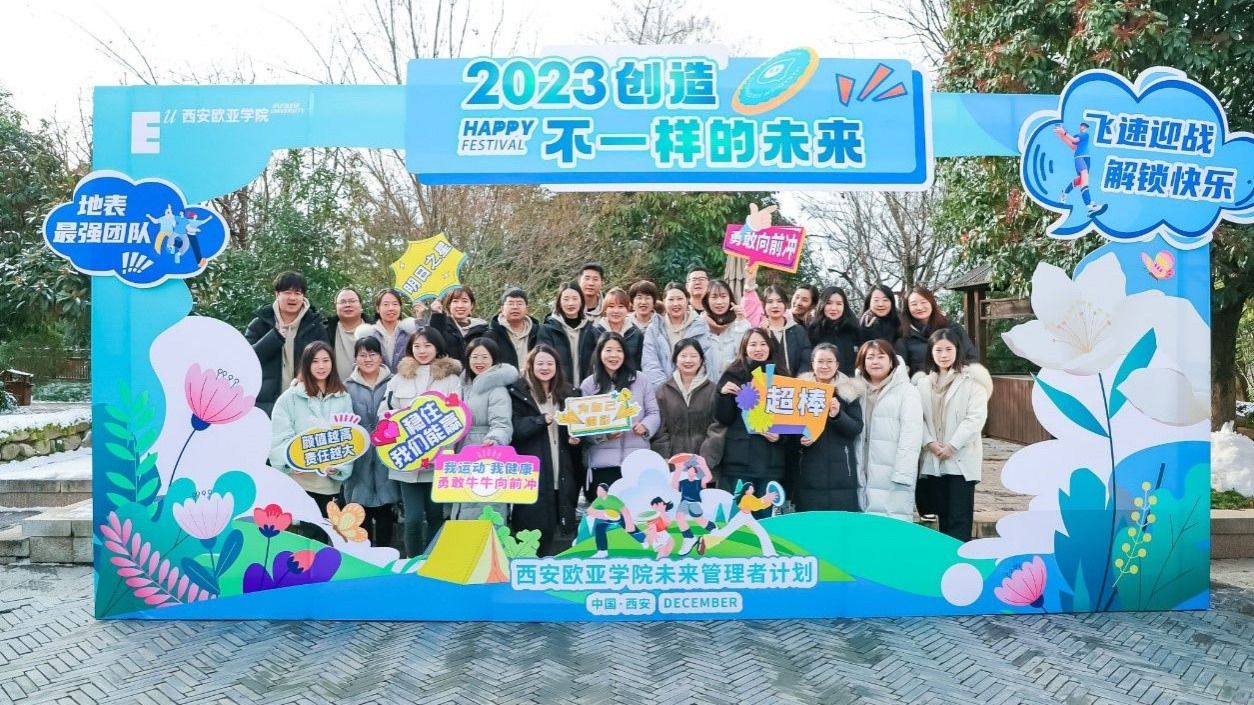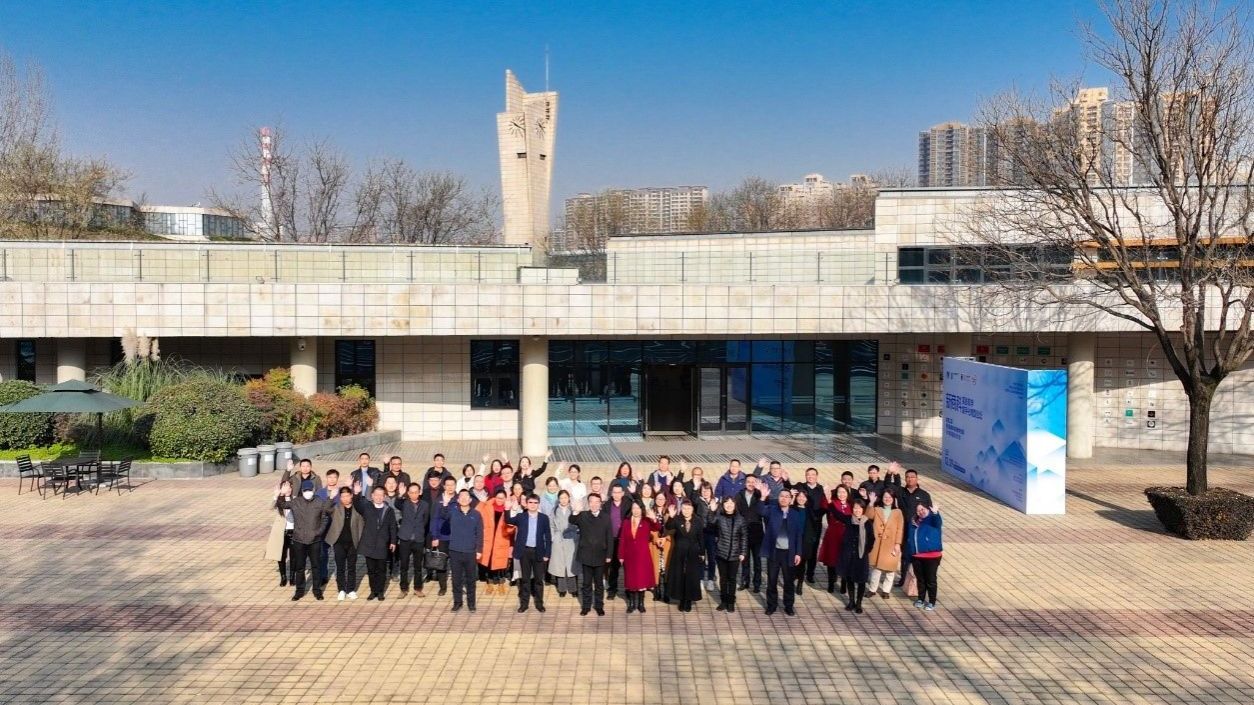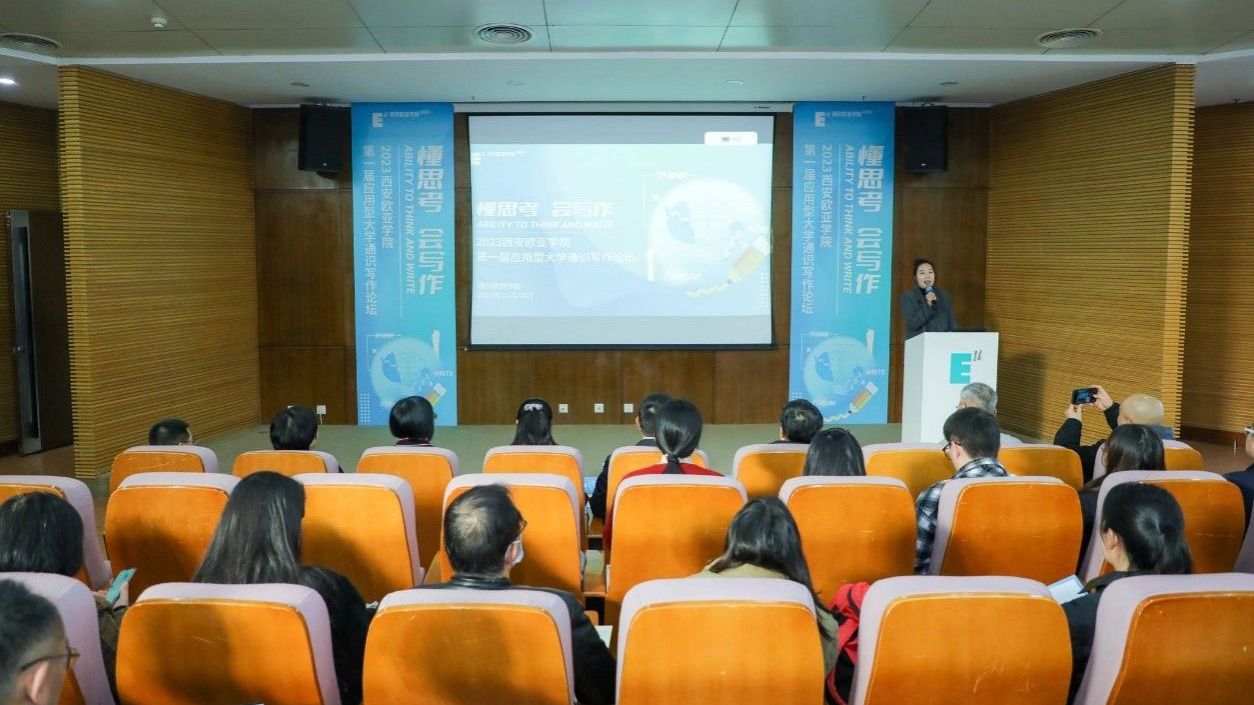On December 9, the West China New Business Practice Teaching Digital Transformation Forum and the Second Annual Meeting of the West China New Business Practice Teaching Innovation and Sharing Alliance were held at Xi'an Eurasian University. The forum focused on the theme of "New Business Practice Teaching Digital Transformation." Experts and scholars from various parts of the country delved into the impact of digital transformation on business education and relevant challenges. They shared experimental teaching models adapted for the digital economy era and proposed practical reflections on the industry-education integration in business education under the context of "Digital for Green and Green for Digital."
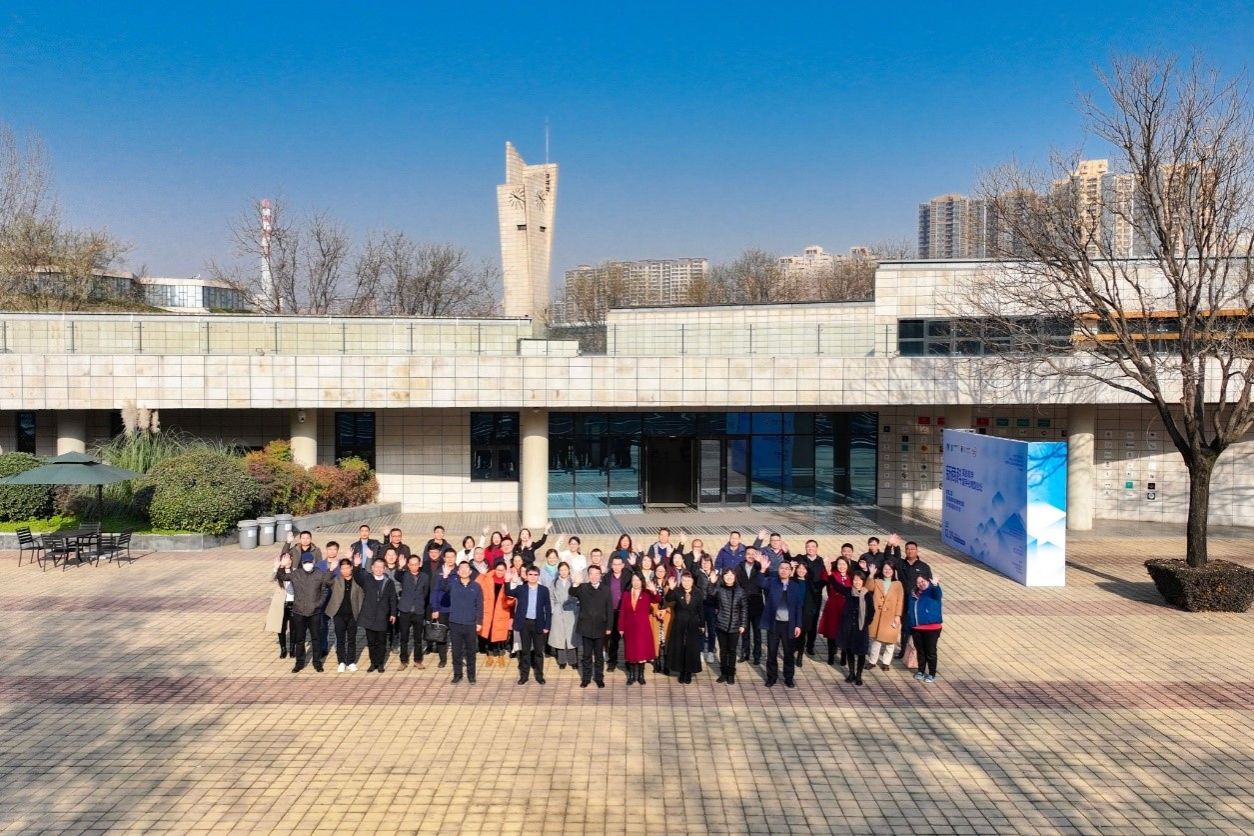
This forum was hosted by the Higher Education Business Administration Teaching Steering Committee of Shaanxi Province, the West China New Business Practice Teaching Innovation and Sharing Alliance, the Ministry of Education's Virtual Teaching and Research Office of Big Data Management, and the Virtual Simulation Experiment Teaching Innovation Alliance's Economic and Management Committee. It was jointly undertaken by the School of Accounting of Xi'an Eurasian University and the School of Management of Xi'an Jiaotong University, with Guangzhou First Software Technology Co., Ltd., China CFO Development Center, and the Accounting Academic Alliance as supporting organizers. A total of 48 higher education institutions and 71 representatives from higher education institutions and enterprises attended the event offline, while more than 28,000 viewers watched the live streaming of the event online.
Several guests were invited to deliver thematic presentations during the forum, including Zhang Xiaogang, Deputy Director of the Economic and Management Experimental Teaching Center at the Renmin University of China and Secretary-General of the Economic and Management Committee of the Virtual Simulation Experiment Teaching Innovation Alliance; Li Hui, Associate Dean of the School of Economics & Management at Northwest University; Wang Hongmei, Associate Dean of the College of Economics and Management at Northwest A&F University; Yang Fan, General Manager of Guangzhou First Technology Co., Ltd.; and Xie Tao, Dean of the School of Accounting at Xi'an Eurasia University. Professor Zhang Jinruo from Chongqing University, Professor Li Yonghong from Xi'an University of Posts and Telecommunications, Professor Chen Lin from Northwestern Polytechnical University, Professor Ma Xubu from Xidian University, and General Manager Wu Zhongyu from Hangzhou Shu Rui Tech Co., Ltd. participated in a roundtable forum on "New Business Practice Teaching Digital Transformation." Following the forum, participants engaged in the "Faculty Workshop" at Xi'an Eurasia University, where teachers from the School of Accounting at the university shared the university's practical teaching experience in "intelligent financial sharing" and "big data audit and internal control."
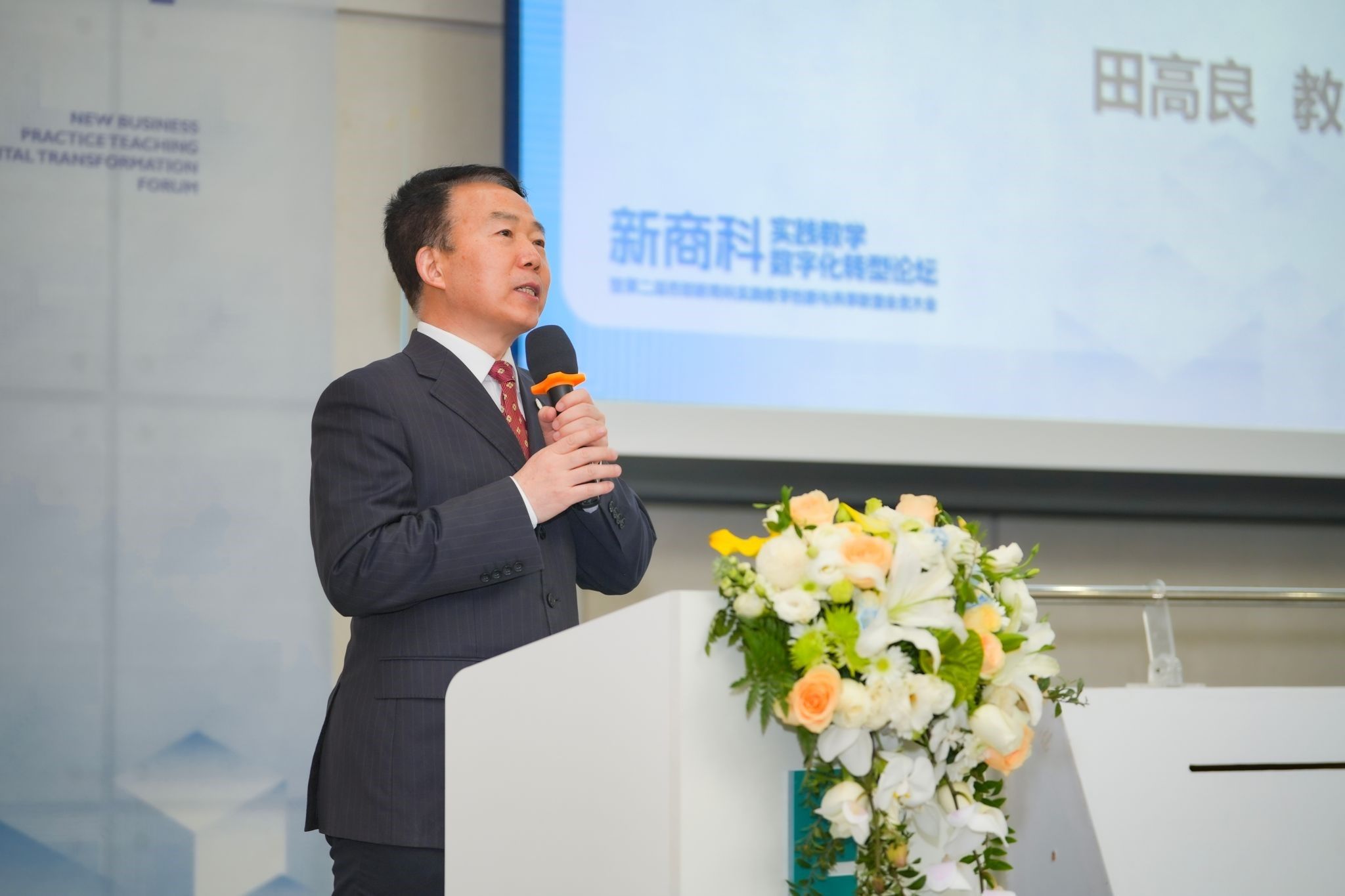
Professor Tian Gaoliang, the initiator of the forum and Associate Dean of the School of Management at Xi'an Jiaotong University, stated during his speech, "The era of digital intelligence has profound implications for global economic development, social progress, and people's lives. It also poses new demands for practical teaching in new business education. Talent cultivation in new business education must seize the opportunities of digital transformation, innovate educational models for the digital age and the future, and nurture business talent for the era intelligence. With the theme of 'New Business Practice Digital Transformation,' this forum aims to explore how practical teaching in the era of digital intelligence can meet the requirements of the era, striving to build a three-dimensional ecosystem for practical teaching and promoting sharing, co-creation, and mutual benefit. This conference is of great significance in promoting the high-quality development of practical teaching in new business education." Professor Tian Gaoliang specifically emphasized the role of Xi'an Eurasia University as a leader in practical business education, especially with the wealth of advanced practical teaching experiences its School of Accounting had accumulated over the course of more than 10 years of development. He expressed his hope that this forum would facilitate in-depth exchanges and knowledge sharing among higher education institutions in practical teaching in business education, contributing to the innovative development of practical teaching in new business education.
Keynote Reports
Scholars Delve into Innovation and Digital Transformation in Practice Teaching in New Business Education
Keynote Report I: Application of Knowledge Graphs in Experimental Teaching and Relevant Practices
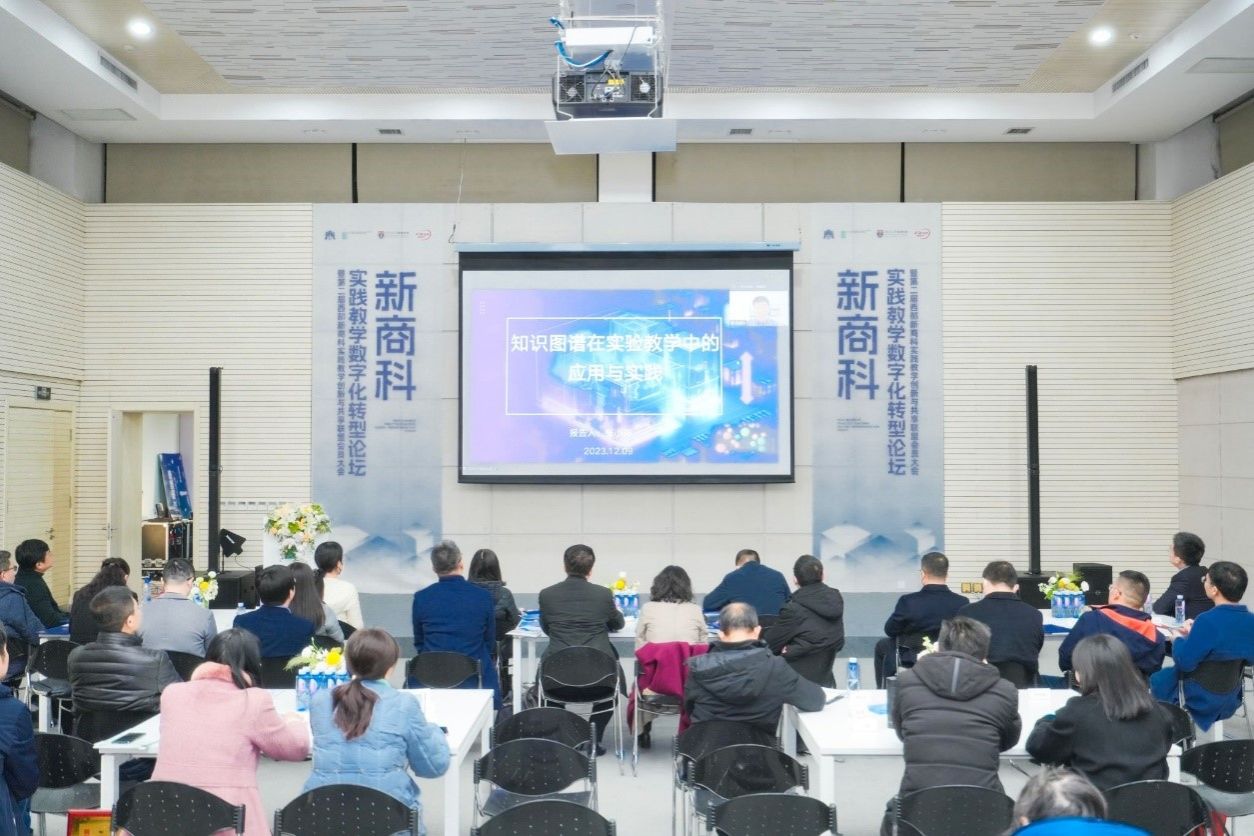
Professor Zhang Xiaogang, Deputy Director of the Economic and Management Experimental Teaching Center at the Renmin University of China and Secretary-General of the Economic and Management Committee of the Virtual Simulation Experiment Teaching Innovation Alliance, shared insights on the "Application of Knowledge Graphs in Experimental Teaching and Relevant Practices." In his opinion, knowledge graphs provide a structured knowledge support system for experimental teaching and can help students to clearly understand the problem chains or networks related to experimental content and enhance learning efficiency. Furthermore, the process of constructing knowledge graphs involves human-machine collaboration and continuous iterations, enabling teachers to provide students with deeper background knowledge of the experiments. This can enhance students' understanding and generalization of experimental content. The application of knowledge graphs in experimental teaching can help students improve their understanding of factual and causal relationships in experimental knowledge, nurturing innovative thinking and practical abilities.
Keynote Report II: Exploration and Practice of Using Practical and Experimental Teaching Models Based on Industry-Education Integration to Support Economic and Management Talent Cultivation
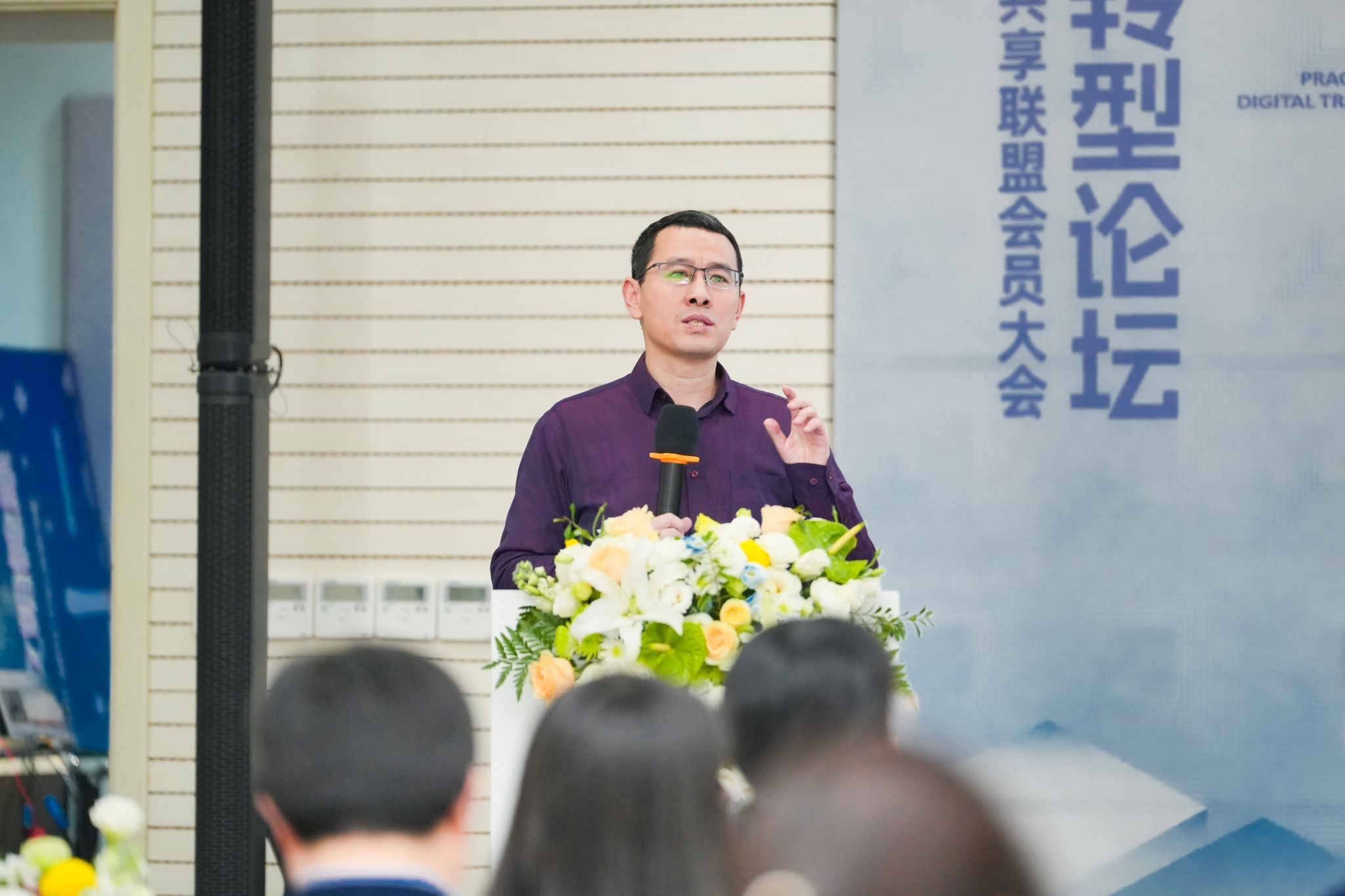
Li Hui, Associate Dean of the School of Economics & Management at Northwest University, pointed out that the current industry-education integration in economic and management talent cultivation faces issues such as inadequate ideological exploration on the industry side, insufficient depth in school-enterprise cooperation, and inadequate long-term mechanisms for industry-education integration for talent development. Drawing from the relevant experience of Northwest University in economic and management talent cultivation based on industry-education integration, Li Hui shared practices of using practical and experimental teaching models based on industry-education integration to support economic and management talent cultivation: First, establishing a value chain for talent cultivation based on industry-education integration under the guidance of ideological education; second, developing a cooperative chain for industry-education integration in the process of talent cultivation; third, create a mechanism chain for industry-education integration in talent cultivation by fostering collaboration and sharing.
Keynote Report III: Reflections on the Construction of Interdisciplinary Comprehensive Training Platform for Economics and Management
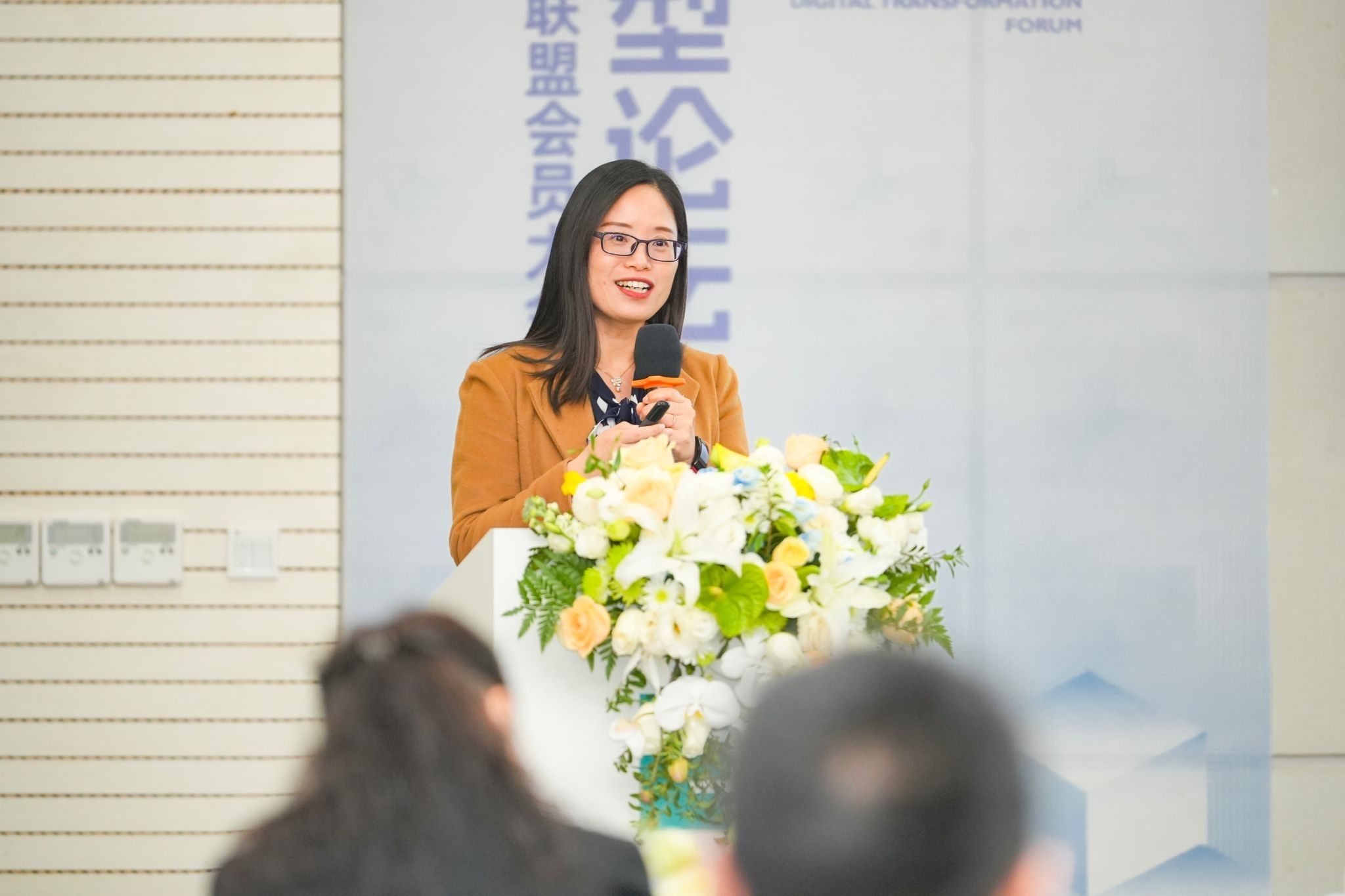
Wang Hongmei, Vice Dean of the College of Economics and Management of Northwest A&F University, pointed out that the current industry development requires the transformation and upgrading of talent's ability. The virtual simulation training platform has overcome the pain points of traditional teaching by allowing students to carry out actual commercial practice operations and make decisions in lifelike business scenarios and situations. This practical learning helps students apply theoretical knowledge to practical problems, thus enhancing their practical operation and problem-solving abilities. With the case of the College of Economics and Management as an example, Wang Hongmei shared the teaching concept of "new business disciplines +" characteristic simulation training and the experience in building a new practical training platform of "economics and management + agriculture and forestry + simulation".
Keynote Report IV: Reflections on the Characteristic Development of Business Majors in the Context of Digital Economy
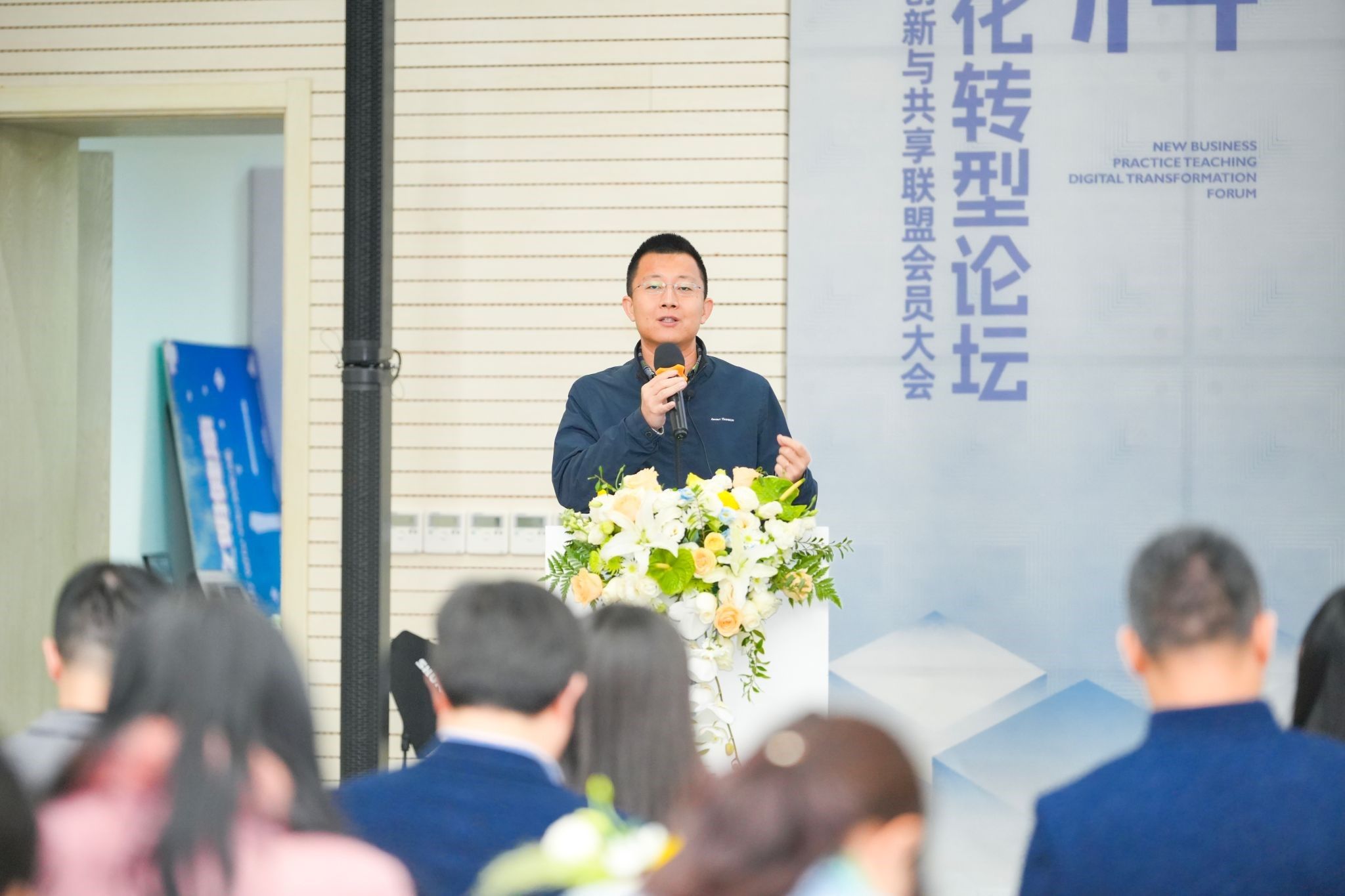
"What tested in the industrial age was an ability to produce something; while what tested in the digital era is an ability to produce something different". Yang Fan, General Manager of Guangzhou First Technology Co., Ltd., shared "Intelligent Manufacturing and Supply Chain Management" and "Digital Commerce and Supply Chain Management", courses developed by First, as well as many practical teaching & application cases for business majors, such as "Emergency Management and Logistics Management Virtual Simulation Experiment" jointly developed by First and Xi'an Jiaotong University. He emphasized that the cross-integration of business majors and other disciplines is of great significance for training versatile new business talent.
Keynote Report V: Reflections on the Practice of Industry-Education Integration in Business Major Education under the Background of Digital for Green and Green for Digital
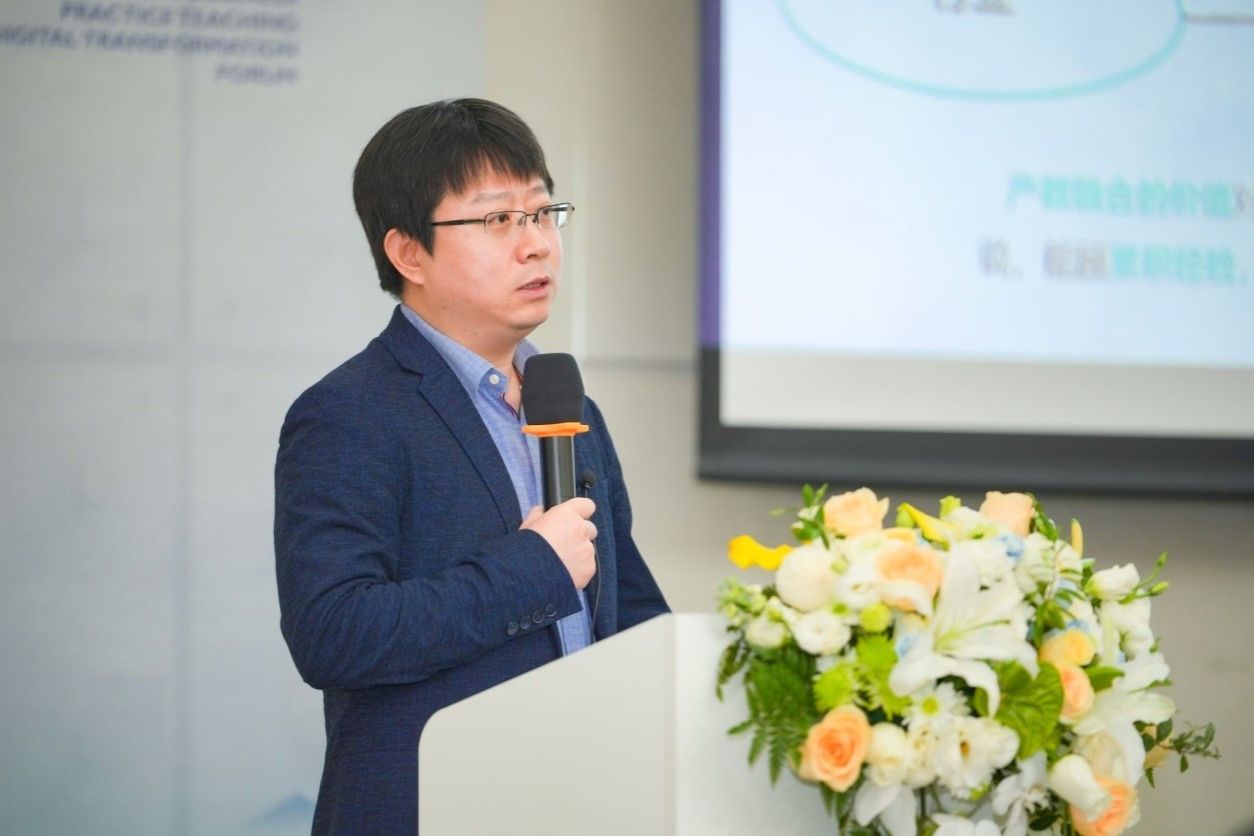
Xie Tao, Dean of the School of Accounting at Xi'an Eurasia University, proposed that the teaching and learning of new business courses should focus on cultivating abilities, be student-centered, aim at knowledge innovation, realize inquiry-based knowledge innovation through teacher-student dialogue, and realize basic knowledge teaching through intelligent education technology. Xie Tao shared the experience of the School of Accounting in promoting innovative training of professional talent through industry-education integration. The School has shared and promoted its high-quality educational resources accumulated during school-enterprise cooperation. It encourages cultivating applied innovation by building the "competency-discipline-specialty-course" matrix. "the significance of the integration of industry and education lies in the fact that for enterprises, it enables them to access resources and talent; for educational institutions, it allows them to keep up with the market and receive timely feedback on teaching issues; for students, it provides opportunities to accumulate experience and enhance employment outcomes".
Round Table Forum
Discussion on "Practical Teaching and Digital Transformation of New Business Majors"
In the Round Table Forum, elites from all walks of life in digital development and business education gathered together to discuss the challenges and countermeasures faced by the transformation of new business practice teaching. As the moderator of the Round Table Forum, Professor Tian Gaoliang from Xi'an Jiaotong University shared insights with Professor Zhang Jinruo from Chongqing University, Professor Li Yonghong from Xi'an University of Posts and Telecommunications, Professor Chen Lin from Northwestern Polytechnical University, Professor Ma Xubu from Xidian University, and General Manager Wu Zhongyu from Hangzhou Shu Rui Tech Co., Ltd. They conducted multi-dimensional and in-depth discussions on the challenges and solutions to the digital transformation of practical teaching for new business majors.
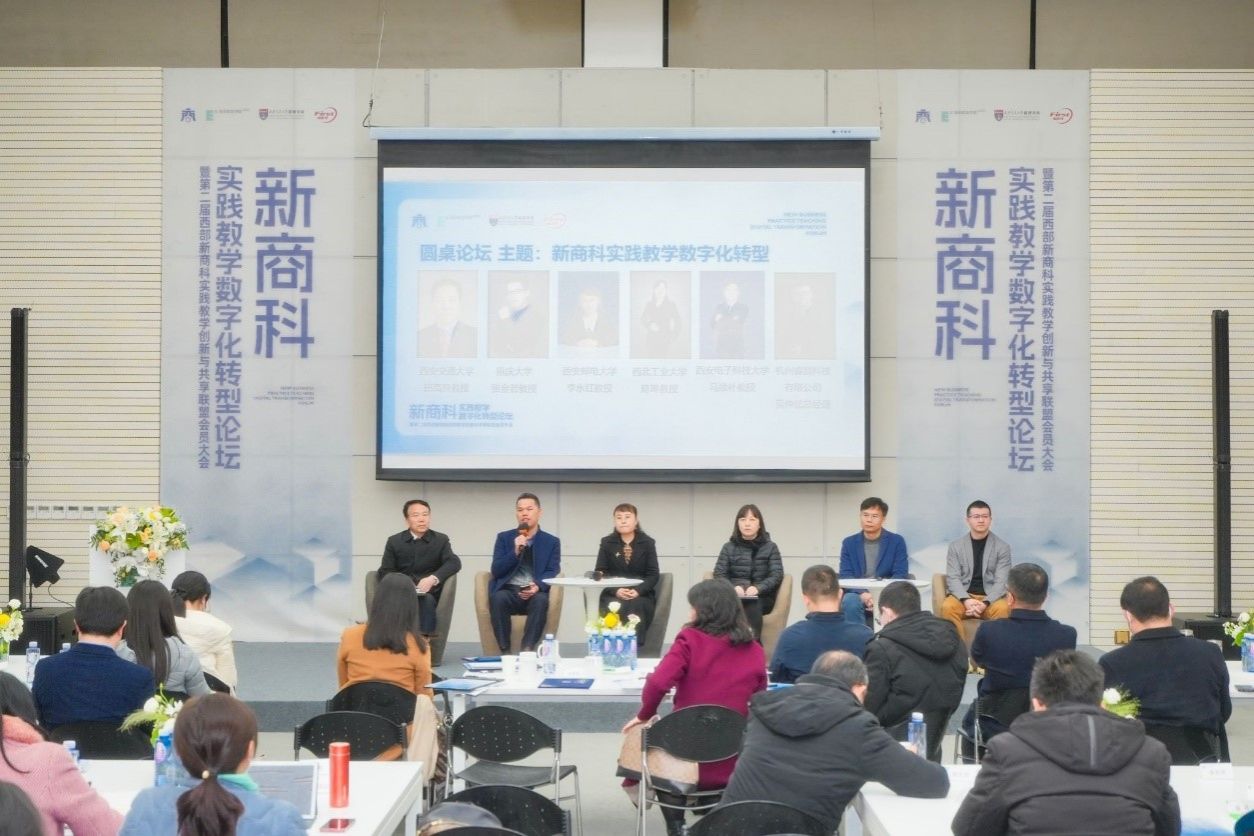
Professor Zhang Jinruo, from Chongqing University, believed that the challenges to practical education for new business majors in the digital era are reflected in two aspects: one is that the knowledge structure system of practical teaching needs to be reconstructed; the other is that interdisciplinary integration and cooperation need to be strengthened. These challenges also put forward new requirements for the faculty, teaching cases and textbook compilation of new business major education. In response to such challenges, universities should start with top-level design and integrate digital transformation into business talent training.
Professor Li Yonghong shared the exploration and practice of Xi'an University of Posts and Telecommunications in the practical education for new business majors. She pointed out that the digital transformation of practical education for business majors still faces three problems: First, the practical education does not match enterprises' current requirements for talent; second, the practical education of business majors does not match the application of enterprise intelligence tools; third, the integration between students' professional learning and enterprises' business learning is insufficient. In response to these challenges, Professor Li Yonghong put forward solutions from the aspects of curriculum construction, textbook construction, and faculty building.
Professor Chen Lin of Northwestern Polytechnical University believed that in the era of digital economy, the market has put forward new requirements for business talent training. Now that the future has come, it is better to actively seek changes and make a gorgeous transformation than waiting for passive adaptation. Professor Chen Lin put forward the approaches of digital transformation in practical education for business majors in curriculum construction, teaching methods, and faculty building. In terms of faculty, cross-field talent can be introduced as new teachers to promote interdisciplinary cooperation among teachers.
Professor Ma Xubu of Xidian University emphasized that the integration between science and education and between industry and education serves as a crucial entry point for implementing practical teaching for new business majors. He highlighted the necessity for new business education to prioritize innovation, enhance its distinctiveness, and establish a practical teaching framework that advances both teaching and scientific research.
General Manager Wu Zhongyu from Hangzhou Shu Rui Tech Co., Ltd. shared cases of Shu Rui Tech's practical training camps and emphasized scenario-driven and interest-driven practical teaching. Wu Zhongyu stressed that practical teaching should be combined with the needs of enterprises, and digital transformation of enterprises requires digital transformation talent.
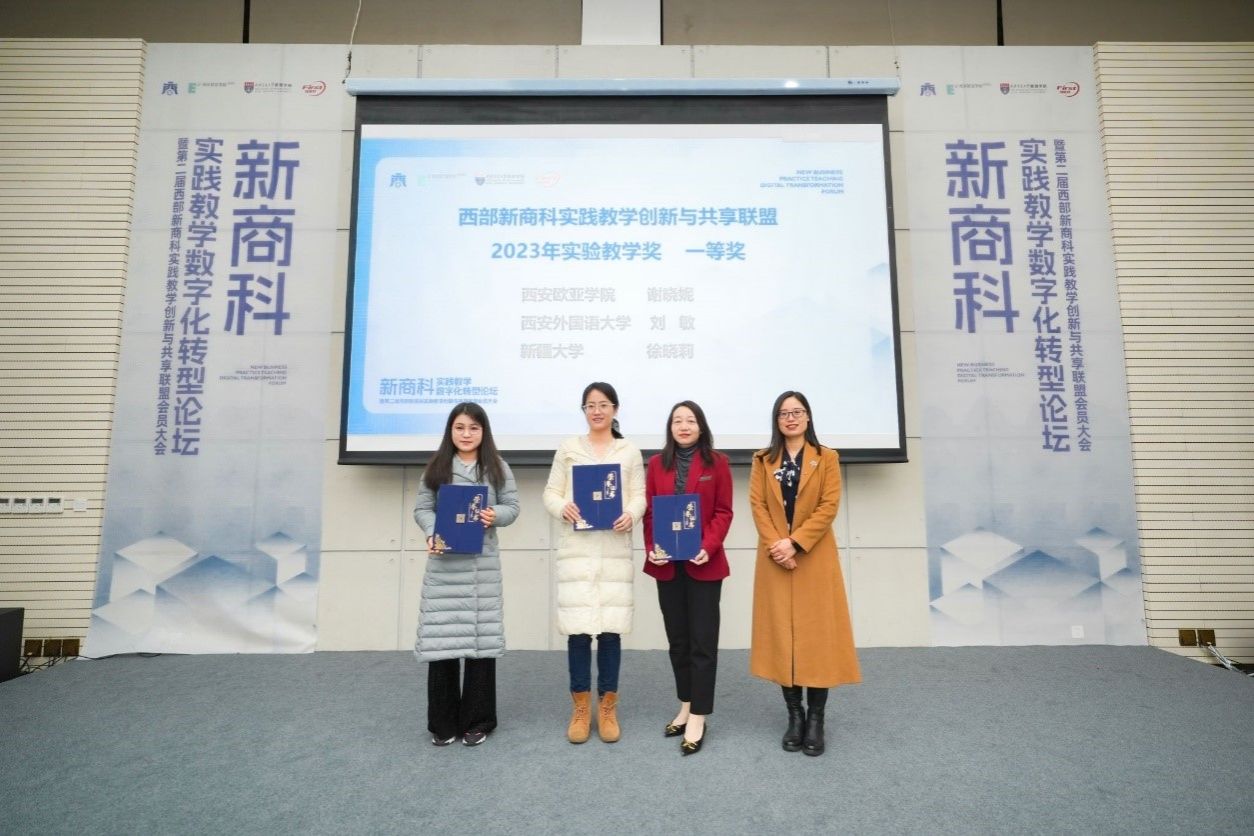
The awarding ceremony for alliance members and the annual award ceremony were also held at the forum. Xie Xiaoni, a teacher at the School of Accounting of Xi'an Eurasia University, won the first prize of the "Experimental Teaching Award of the Western New Business Teaching Innovation and Sharing Alliance".
Faculty Workshop
Experiencing Practical Teaching of "Big Data Audit and Internal Control" and "Intelligent Finance Sharing"
Associate Professor He Ming, Director of the Audit Course Center of the School of Accounting at Xi'an Eurasia University, shared a report entitled "Technology-led and Industry-Education Integration Boosts the Construction and Development of the Audit Major." He also shared with teachers participating in the training the talent cultivation orientation of the audit major of Xi'an Eurasia University in terms of "audit informatization and risk control", shared that the audit major used information technology to innovate its practical teaching system, actively explored the relevant experience of cooperating with leading accounting firms in the industry to build industry colleges and cultivate application-oriented talent for local enterprises.
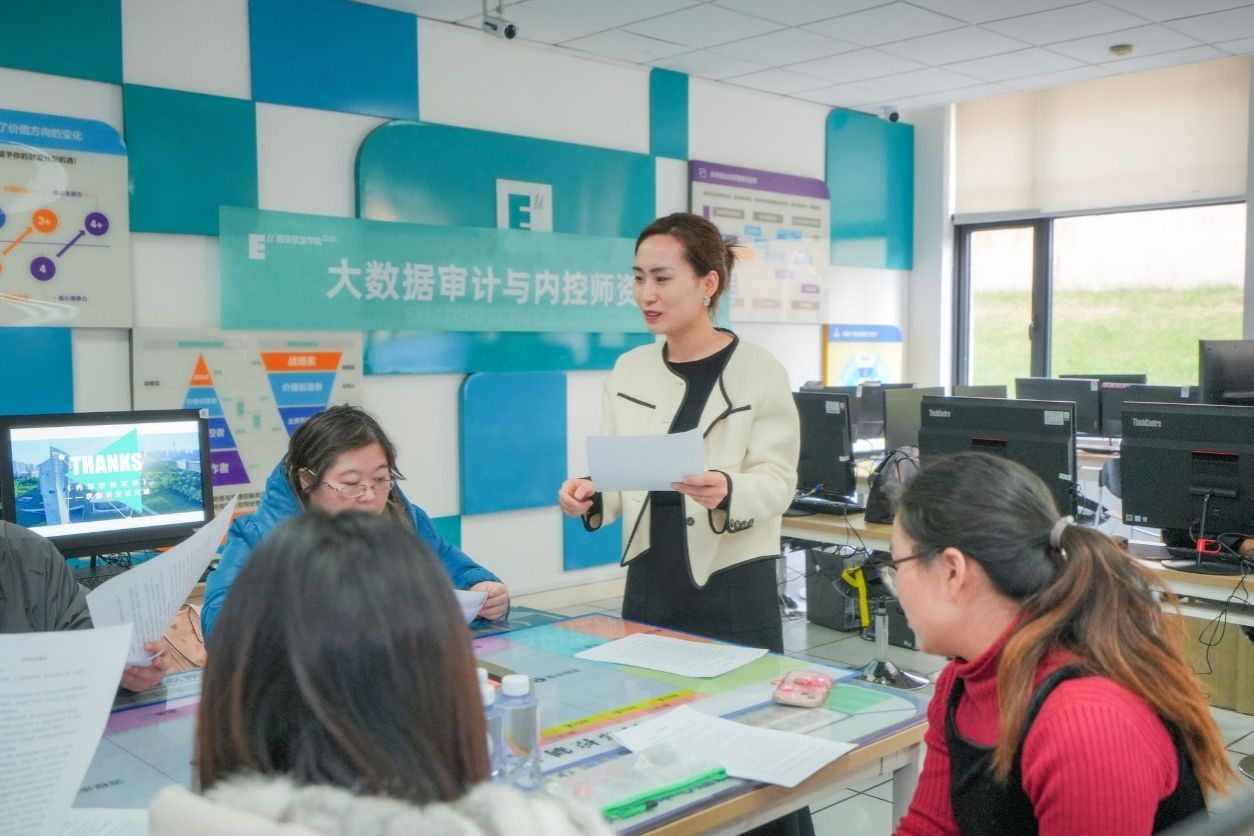
Three teachers from the Audit Course Center, Zhang Lei, He Sijia, and Wu Yanni, shared the reform and construction of the course "Internal Control Practice" and guided the participants to experience the "Physical Simulation Sand Table for Internal Control and Risk Management" independently developed and designed by Xi'an Eurasia University. They showed in detail the specific application of the sand table in the actual teaching process. The innovative teaching methods were unanimously praised by the participating teachers.
Associate Professor Luo Yanni, Director of the Training Course Center of School of Accounting at Xi'an Eurasia University, shared the practical teaching system of the School of Accounting based on the concepts of "intelligent finance" and "digital transformation". Luo Yanni shared the specific application of project-based teaching in School of Accounting by taking courses such as Comprehensive Training on Financial Sharing, Business Intelligence Analysis, and SAP HANA Operation and Development as examples, and displayed student works such as "RPA Intelligent Finance Robot Operation" and "Business Operation and Operational Analysis Report of Financial Shared Center of Casting Group".
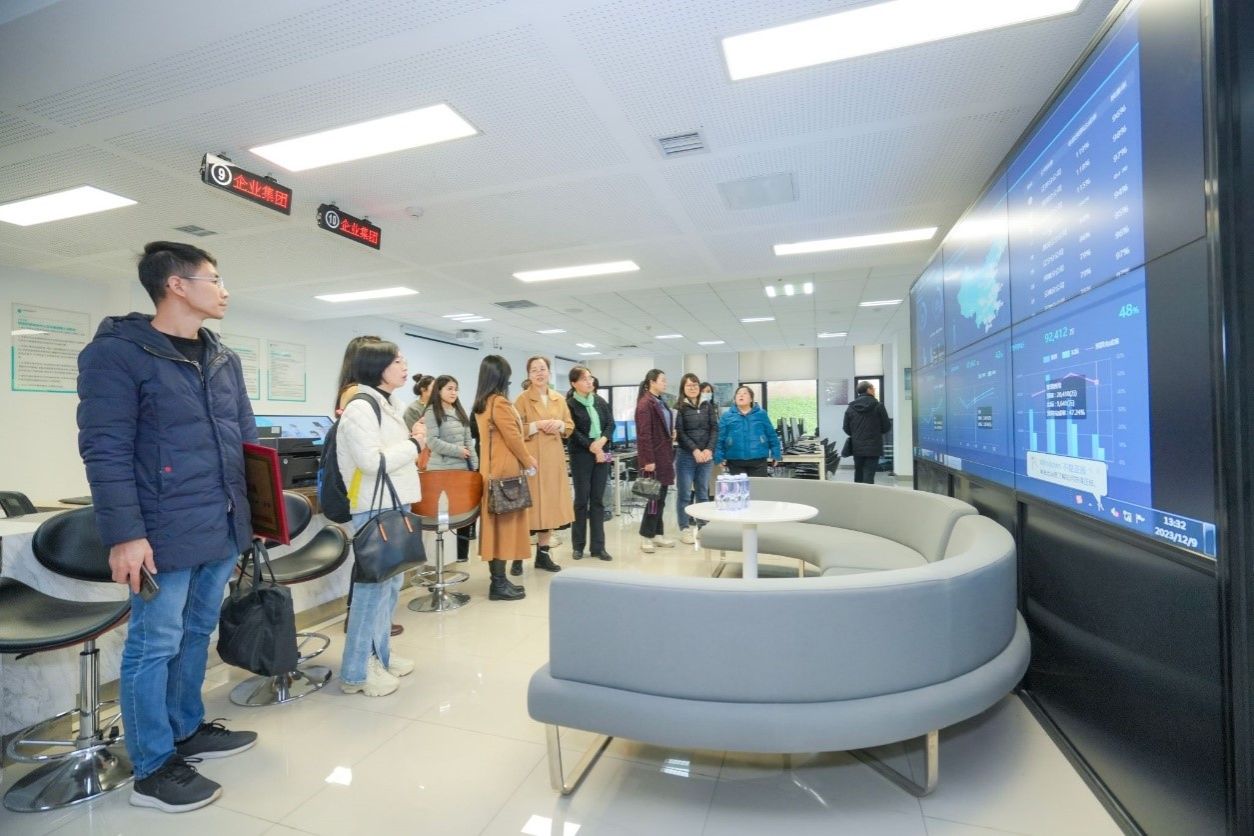
Zhao Huan and Zheng Juan shared the development and application of intelligent finance robots and the curriculum system of the operation management module of the Financial Sharing Center based on RPA financial robot applications. Zhao Huan pointed out that in financial work, human labor is gradually being replaced by computers, and financial robots, as an upgraded version of computers, can better adapt to this change and improve financial management. With the development of the social economy and the rise of labor costs, enterprises have higher demand for automation. The emergence of financial robots can replace some labor, reduce human costs, and improve the benefits of enterprises. The two teachers also demonstrated the practical operation of five project cases, including the RPA online banking payment robot, the RPA management fee aggregation robot, the RPA tax invoicing robot, the RPA stock transaction data robot, and the RPA VAT invoice OCR automatic recognition robot.
According to teachers who participated in the workshop, this training was rich in content, and they learned a lot: not only how to strengthen the construction of new business talent theoretically but also how to get professional inspiration from practice. This training provided a valuable exchange opportunity for cultivating business talent among colleges and universities in the digital era. Also, it injected new vitality into promoting the development of digital transformation of practical teaching of new business majors.
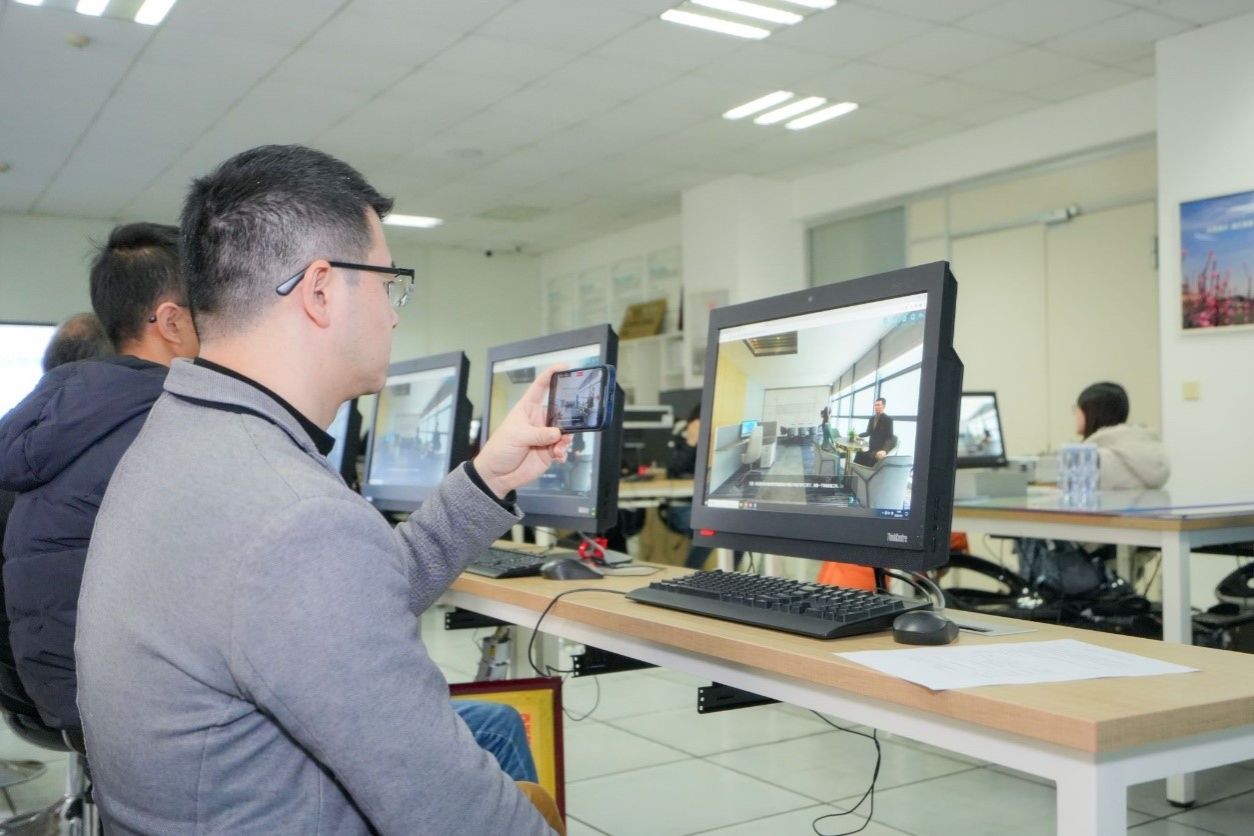
The Forum on Digital Transformation of New Business Major Practical Education adheres to the development concept of "extensive consultation, co-construction, co-governance, sharing and win-win", and takes "innovating experimental teaching models, coordinating curriculum faculty, building a school-enterprise green ecosystem, opening up the campus experimental platform, and sharing regional high-quality resources" as its vision. In the future, the School of Accounting of Xi'an Eurasia University will make full use of practical teaching co-construction and sharing resources to comprehensively improve experimental teaching and the quality of talent training, thus facilitating the digital transformation and innovative development of practical education for new business majors.
The forum was broadcast synchronously online and offline. For the convenience of learning and exchanges among universities and enterprises, please scan the QR code below for conference playback.
(Contributed by Xue Zhenni, School of Accounting; Photo by Liang Yinuo)




